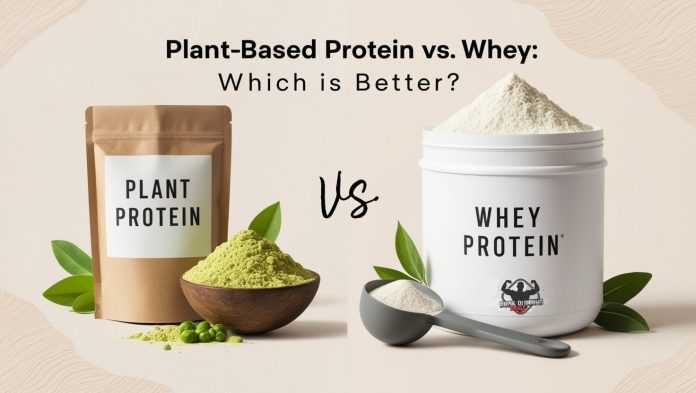Protein powders have become a household staple when it comes to enhancing general nutrition, promoting muscle growth, and aiding in recovery. Supplements like plant-based protein and whey protein are frequently used by people who struggle to meet their daily protein needs, whether they are athletes, fitness enthusiasts, or just regular people. Which option should you pick, though, given the abundance of options?
Whey and plant-based proteins each have special advantages and possible disadvantages. Your lifestyle, food preferences, and health objectives all play a significant role in making the best decision. In-depth discussions of plant-based and whey proteins, their benefits and drawbacks, nutritional distinctions, and the ideal situations for each will be covered in this blog.
Comprehending Protein Powders
Energy balance, immunological support, hormone regulation, and muscle repair all depend on protein. Whole foods like chicken, beans, tofu, or eggs can provide protein, but for people who require additional assistance, protein powders provide a quick-digesting, convenient alternative.
When cheese is being made, milk is used to make whey protein. It is the gold standard in the fitness industry because it is a complete protein that contains high concentrations of all nine essential amino acids.
Typically, peas, rice, hemp, soy, or a combination of these are used to make plant-based protein powders. They might not always contain all of the essential amino acids, depending on the source, but contemporary formulations frequently incorporate several sources to fill the gap.
Whey Protein: Benefits and Drawbacks
✅ Whey Protein Benefits
Full Profile of Amino Acids
All nine essential amino acids are present in whey protein, but it is especially high in branched-chain amino acids (BCAAs), which are essential for the synthesis of muscle protein and include leucine, isoleucine, and valine.
Quick Absorption
Since whey digests quickly, it’s perfect for post-workout recovery, when your muscles are most open to absorbing nutrients.
Strength and Muscle Growth
Whey protein is one of the best supplements for increasing muscle mass and strength, according to numerous studies.
Adaptable and Accessible
Numerous formulations of whey, including concentrate, isolate, and hydrolysate, are available to meet various dietary and fitness requirements.
Immune-Supporting Qualities
Immunoglobulins and lactoferrin, which are found in whey protein, may strengthen the immune system.
Drawbacks of Whey Protein
Not suitable for vegans
Vegans and people on strict plant-based diets should avoid whey because it is a dairy product.
Digestive Problems
Whey concentrate frequently causes bloating, gas, or diarrhea in people who are lactose intolerant. Even though whey isolate is refined and contains less lactose, sensitivities can still happen.
Possible Allergies
Some people cannot tolerate whey at all because they are allergic to dairy proteins.
Additives and Processing
Since many whey powders are processed, they might contain artificial flavors, sweeteners, or fillers that some consumers who are health-conscious would rather not have.
Plant-Based Protein: Benefits and Drawbacks
✅ Plant-Based Protein Benefits
Fit for Every Diet
Since plant-based proteins are inherently vegetarian, vegan, and dairy-free, practically everyone can consume them.
Easy on the Digestion
Compared to whey, the majority of plant-based proteins are easier on the stomach, particularly for people who are lactose intolerant or have dairy sensitivities.
Rich in Nutrients
Additional nutrients such as fiber, antioxidants, omega-3 fatty acids (from hemp), and micronutrients are frequently found in plant proteins, depending on the source.
Environmentally Friendly
Compared to animal-derived protein, plant protein production typically has a smaller environmental impact, making it a more sustainable option.
Friendly to Allergens
Rice and pea proteins, in particular, are hypoallergenic, making them a safe choice for people with dietary allergies.
The Drawbacks of Plant-Based Protein
Amino acid profiles that are incomplete (sometimes)
Certain amino acids may be absent from plant proteins that come from a single source, such as rice or peas. For instance, pea protein has more methionine than rice protein, and rice protein has less lysine. Blends are frequently used to address this.
Texture and Taste
In contrast to whey’s smooth texture, plant proteins can be grittier and taste more earthy.
Protein Quality Is A Little Lower
Blends work well, but whey may have a higher biological value—a measure of how well the body uses protein—than plant proteins.
The cost component
While prices are becoming more competitive, some premium plant-based blends cost more than whey.
Comparing Whey and Plant-Based Features in Terms of Nutrition
| Feature | Whey Protein | Plant-Based Protein |
|---|---|---|
| Protein Quality | High (rich in BCAAs and complete protein) | Moderate to High (complete blends) |
| Digestibility | Fast Absorption Speed may result in problems for people who are lactose intolerant | In general, it is simpler to digest |
| Nutritional Appropriateness | Not vegetarian or vegan | Completely vegetarian or vegan |
| Nutrients | Mostly protein, with a few immune components | Omega-3, fiber, and antioxidants (depending on the source) |
| Texture and Taste | Creamy and smooth | Earthy and occasionally gritty |
| Impact on the Environment | An increased carbon footprint | More environmentally friendly |
Top Applications for Whey Protein
Recovery After Exercise
Whey is ideal right after vigorous exercise because of its quick absorption and high BCAA content.
Programs for Building Muscle
Whey is frequently used by bodybuilders and athletes who want to achieve maximum hypertrophy because of its demonstrated efficacy.
Rapid Boost of Protein
For busy people who require a quick and effective protein source, whey shakes are convenient.
Weight Loss
Whey is helpful in calorie-restricted diets because it is very satiating and can help decrease hunger.
Top Applications for Plant-Based Protein
Support for Nutrition Every Day
For vegetarians or vegans in particular, plant protein is a great way to make up for protein deficiencies.
Recipes and Smoothies
Plant-based powders are excellent for smoothies because they mix well with fruits, vegetables, and plant milks.
Sensitivities to Digesting Food
Plant protein is a mild substitute for those who have dairy allergies, lactose intolerance, or IBS.
Sustainable Lifestyle Options
Plant-based protein is frequently chosen by people who want to lessen their carbon footprint.
Nutrition in Balance
Plant proteins are a good choice for daily wellness because they provide additional nutrients like fiber, which promotes gut health.
What Should You Pick?
Choosing between plant-based and whey protein depends on your objectives, tastes, and health requirements rather than which is inherently “better.”
Select whey protein if
- You’re concentrating on recovering and gaining muscle.
- You have a good tolerance for dairy.
- You’re looking for a protein source that is proven to digest quickly.
Select plant-based protein if
- You lead a vegetarian or vegan lifestyle.
- You are allergic to dairy products or have lactose intolerance.
- You favor sustainability and whole-food nutrition.
Combining the Best Features of Both Worlds
It’s interesting to note that depending on the situation, many people now use both types. For instance, some athletes use plant-based protein during the day for steady digestion and additional nutrients, and whey after workouts for quick absorption.
In order to optimize amino acid diversity, taste, and digestibility, some supplement brands also provide hybrid protein powders that combine whey and plant sources.
Concluding Remarks
Whey protein and plant-based protein both have a role in contemporary diets. Whereas plant-based proteins perform better in terms of digestibility, inclusivity, and sustainability, whey protein excels in terms of muscle growth, recovery, and quick absorption.
Your decision is based on your long-term health objectives, ethical preferences, and body’s tolerance. Whey can be an effective ally in your quest for improved health and fitness, whether you’re adding it to your post-workout shake or making a plant-based smoothie for breakfast.
Consistency is key, so choose a protein that fits your lifestyle and helps you meet your daily nutritional needs.


